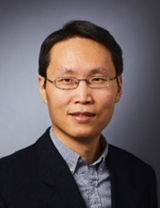-
Conserved transcriptional regulation by BRN1 and BRN2 in neocortical progenitors drives mammalian neural specification and neocortical expansion.
Barão, Soraia; Xu, Yijun; Llongueras, José P; Vistein, Rachel; Goff, Loyal; Nielsen, Kristina J; Bae, Byoung-Il; Smith, Richard S; Walsh, Christopher A; Stein-O'Brien, Genevieve; Müller, Ulrich Nature communications 2024 Sep;15(1):8043
-
Transcriptional Control of Neocortical Size and Microcephaly.
Barão, Soraia; Xu, Yijun; Vistein, Rachel; Goff, Loyal; Nielsen, Kristina; Bae, Byoung-Il; Smith, Richard S; Walsh, Christopher A; Stein-O'Brien, Genevieve; Müller, Ulrich bioRxiv : the preprint server for biology 2023 Nov;
-
Oncogenic ASPM is a regulatory hub of developmental and stemness signaling in cancers.
Tsai, Kelvin K; Bae, Byoung-Il; Hsu, Chung-Chi; Cheng, Li-Hsin; Shaked, Yuval Cancer research 2023 Jun;
-
The polymicrogyria-associated GPR56 promoter preferentially drives gene expression in developing GABAergic neurons in common marmosets.
Murayama, Ayako Y; Kuwako, Ken-Ichiro; Okahara, Junko; Bae, Byoung-Il; Okuno, Misako; Mashiko, Hiromi; Shimogori, Tomomi; Walsh, Christopher A; Sasaki, Erika; Okano, Hideyuki Scientific reports 2020 Dec;10(1):21516
-
Aspm knockout ferret reveals an evolutionary mechanism governing cerebral cortical size.
Johnson, Matthew B; Sun, Xingshen; Kodani, Andrew; Borges-Monroy, Rebeca; Girskis, Kelly M; Ryu, Steven C; Wang, Peter P; Patel, Komal; Gonzalez, Dilenny M; Woo, Yu Mi; Yan, Ziying; Liang, Bo; Smith, Richard S; Chatterjee, Manavi; Coman, Daniel; Papademetris, Xenophon; Staib, Lawrence H; Hyder, Fahmeed; Mandeville, Joseph B; Grant, P Ellen; Im, Kiho; Kwak, Hojoong; Engelhardt, John F; Walsh, Christopher A; Bae, Byoung-Il Nature 2018 Apr;556(7701):370-375
-
Microcephaly Proteins Wdr62 and Aspm Define a Mother Centriole Complex Regulating Centriole Biogenesis, Apical Complex, and Cell Fate.
Jayaraman, Divya; Kodani, Andrew; Gonzalez, Dilenny M; Mancias, Joseph D; Mochida, Ganeshwaran H; Vagnoni, Cristiana; Johnson, Jeffrey; Krogan, Nevan; Harper, J Wade; Reiter, Jeremy F; Yu, Timothy W; Bae, Byoung-Il; Walsh, Christopher A Neuron 2016 Nov;92(4):813-828
-
Mutations in Human Accelerated Regions Disrupt Cognition and Social Behavior.
Doan, Ryan N; Bae, Byoung-Il; Cubelos, Beatriz; Chang, Cindy; Hossain, Amer A; Al-Saad, Samira; Mukaddes, Nahit M; Oner, Ozgur; Al-Saffar, Muna; Balkhy, Soher; Gascon, Generoso G; Homozygosity Mapping Consortium for Autism; Nieto, Marta; Walsh, Christopher A Cell 2016 Oct;167(2):341-354.e12
-
Allele-specific regulation of mutant Huntingtin by Wig1, a downstream target of p53.
Kim, Sun-Hong; Shahani, Neelam; Bae, Byoung-Ii; Sbodio, Juan I; Chung, Youjin; Nakaso, Kazuhiro; Paul, Bindu D; Sawa, Akira Human molecular genetics 2016 Jun;25(12):2514-2524
-
Evolutionarily dynamic alternative splicing of GPR56 regulates regional cerebral cortical patterning.
Bae, Byoung-Il; Tietjen, Ian; Atabay, Kutay D; Evrony, Gilad D; Johnson, Matthew B; Asare, Ebenezer; Wang, Peter P; Murayama, Ayako Y; Im, Kiho; Lisgo, Steven N; Overman, Lynne; Šestan, Nenad; Chang, Bernard S; Barkovich, A James; Grant, P Ellen; Topçu, Meral; Politsky, Jeffrey; Okano, Hideyuki; Piao, Xianhua; Walsh, Christopher A Science (New York, N.Y.) 2014 Feb;343(6172):764-8
-
Nitric oxide-induced nuclear GAPDH activates p300/CBP and mediates apoptosis.
Sen, Nilkantha; Hara, Makoto R; Kornberg, Michael D; Cascio, Matthew B; Bae, Byoung-Il; Shahani, Neelam; Thomas, Bobby; Dawson, Ted M; Dawson, Valina L; Snyder, Solomon H; Sawa, Akira Nature cell biology 2008 Jul;10(7):866-73
-
Neuroprotection by pharmacologic blockade of the GAPDH death cascade.
Hara, Makoto R; Thomas, Bobby; Cascio, Matthew B; Bae, Byoung-Il; Hester, Lynda D; Dawson, Valina L; Dawson, Ted M; Sawa, Akira; Snyder, Solomon H Proceedings of the National Academy of Sciences of the United States of America 2006 Mar;103(10):3887-9
-
Mutant huntingtin: nuclear translocation and cytotoxicity mediated by GAPDH.
Bae, Byoung-Il; Hara, Makoto R; Cascio, Matthew B; Wellington, Cheryl L; Hayden, Michael R; Ross, Christopher A; Ha, Hyo Chol; Li, Xiao-Jiang; Snyder, Solomon H; Sawa, Akira Proceedings of the National Academy of Sciences of the United States of America 2006 Feb;103(9):3405-9
-
p53 mediates cellular dysfunction and behavioral abnormalities in Huntington's disease.
Bae, Byoung-Il; Xu, Hong; Igarashi, Shuichi; Fujimuro, Masahiro; Agrawal, Nishant; Taya, Yoichi; Hayward, S Diane; Moran, Timothy H; Montell, Craig; Ross, Christopher A; Snyder, Solomon H; Sawa, Akira Neuron 2005 Jul;47(1):29-41
-
Inositol hexakisphosphate kinase-2, a physiologic mediator of cell death.
Nagata, Eiichiro; Luo, Hongbo R; Saiardi, Adolfo; Bae, Byoung-Il; Suzuki, Norihiro; Snyder, Solomon H The Journal of biological chemistry 2005 Jan;280(2):1634-40
-
A mammalian iron ATPase induced by iron.
Barañano, D E; Wolosker, H; Bae, B I; Barrow, R K; Snyder, S H; Ferris, C D The Journal of biological chemistry 2000 May;275(20):15166-73

